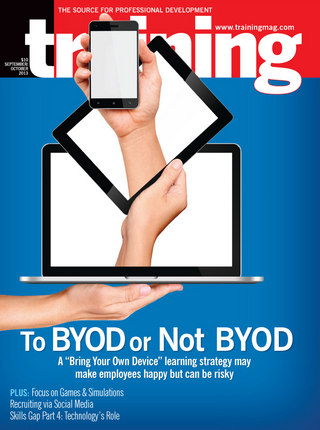Home September / October 2013
Trainer Talk: Embracing Technology
By Bob Pike, CSP, CPAE, CPLP Fellow
I have to admit I’m a bit of a geek. OK, OK, I’m probably all geek. I love all things techy—especially when it comes to training. So it is easy for me to be not just leading edge, but bleeding edge.
Training magazine Events: Positive Genius
By Shawn Achor
What is more important than IQ and emotional intelligence combined?
Over the last two decades, Training departments have split their resources based upon whether they believed technical skills or emotional intelligence was more important. This debate led us away from the most important part: You cannot succeed long term if you have one but not the other.
Learning Matters: Digital Darwinism
By Tony O’Driscoll, Executive Director, Duke Corporate Education
Best Practices: Flipping the Classroom
By Neal Goodman, Ph.D., President, Global Dynamics, Inc.
Is it possible to provide the learning and development that usually would take place in a classroom environment and flip it so the content is provided before the class ever meets? The value of classroom instruction is the spontaneity and serendipitous learning that cannot be replicated in an online e-learning classroom. But it is possible to use online tools for their maximum benefit and still retain the value of interpersonal interaction.
World View: Focus on Egypt
By Jean Abinader, Senior Associate, Global Dynamics Inc.
Egypt’s future at the center of regional Arab and European business activity based on its large domestic market and critical geographic position is in transition. Although the Muslim Brotherhood-led government is bullish on business, there is a vocal minority distrustful of Western companies with previous regime connections.
How-To: Conduct CBT for a Non-Computer-Based Workforce
By Stephen Evans, Director, Training, Cardon Outreach, LLC
From 1996 to 2012, employees at the Tooele Chemical Agent Disposal Facility (TOCDF) in Stockton, UT, worked to destroy the nation’s largest stockpile of chemical weapons. Due to the nature of our work, we had a significant training footprint, which included a series of technical operator training; compliance or regulatory training; and dozens of courses on safety, health, environmental, and security-related topics.
Soapbox: SAP Training Trends
By Chelsea Perino, Marketing Manager,and Thomas Michael, CEO, Michael Management Corporation
The last decade has seen exponential growth in the online training space. People are relying on the Internet more and more—as a place to research products, gather and share information, stay in contact with others, and stay up to date on the most recent trends—and this presence and activity in the digital space only continues to increase as technology progresses.
Soapbox: The Importance of an Independent Evaluator
By Steven Katzman, Ph.D.,Director of Organizational Effectiveness and Performance Measurement, KPMG LLP
Like most organizations committed to the continuous improvement of training, KPMG LLP highly values the post-course debrief. But in the past, when our content developers and instructional designers were asked about a program, their responses often were met with skepticism. Could a professional so deeply involved in the development of a course ever be truly objective about assessing its effectiveness?
Get Smart
My husband and I both have what he not so affectionately calls “dumb phones.” Granted, if we forked over $30 a month for a data plan, we would have Internet access on these mobile phones. But we can’t scan QR codes in the grocery store; we can’t send photos from our phones to our iPad and Kindle; we can’t share content simply by touching our phones together. You get the picture.


